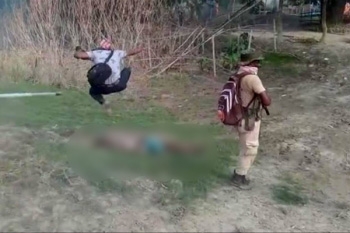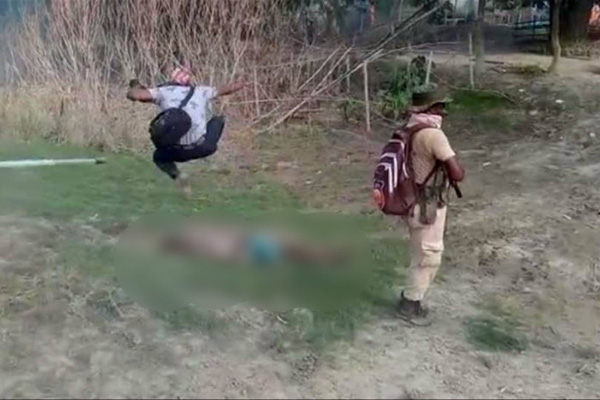
 A. J. Philip
A. J. Philip

A few years before the Bhopal gas tragedy in 1984, considered the world’s worst industrial accident, I visited the Union Carbide laboratory on Shamla Hills in the city of lakes. There, I saw the scientists breeding different kinds of pests for experimental purposes. Their aim was to prepare pesticides which can kill pests but cannot harm human beings. Potency against pests and impotency against man. That is the principle followed in the manufacture of pesticides the world over.
Among the insects they bred were termites. They are small insects that live in large groups, mainly in hot regions. They eat the wood of trees and buildings. And they grow so fast that a wooden cupboard can be finished in a matter of days.
Nobody has any sympathy for the termites. When Union Home Minister Amit Shah used the term “termites” for the so-called infiltrators in Assam, I took it as an example of his crudity and cruelty. How can anyone compare man, the crown of God’s creation, to an insect?
Also, I never imagined that someone would take his cue from Amit Shah’s statement and treat a human being like a termite. That credit should go to Bijay Shankar Baniya, a photographer attached to the Darrang district administration in Assam. He had accompanied the policemen to the Sipajhar area in the same district from where they were evicting people who had been living there for decades.
The police force headed by the Chief Minister’s own brother had to fear neither God nor his superiors. Small wonder that the police used fire power to overpower the poor residents, who had lost everything they had. Whatever they could clutch at while they were running away from the police remained with them. The land they cultivated for decades, the houses where they lived in and the vegetables and grains they grew were suddenly gone. They became aliens in their own land!
Some of them preferred to face the bullets, rather than live a life of indignity. Two of them fell down on the land they considered as theirs till the police bullets pierced their hearts. Baniya would have seen them falling through his viewfinder or on the camera screen. He would never have seen them alive, let alone fought with them. The blood flowing from their bodies would have made the scene, both sanguine and macabre.
No, Baniya was not angry with them. One can be angry with a known person like your spouse or your children. How can one be angry with an unknown person? That, too, when that person is dying of bullet injury? What Baniya had for him was hatred, not anger.
Aristotle believed that anger can be cured by time, but not hatred. Anger is accompanied by pain, hatred is not. That is why there was no remorse on his face.
It was his hatred for the Muslim that forced him to jump up on the body and stomp it. The hapless man might have taken his last breath while he was stomped by Baniya. I could not believe that it was done by a photographer who, I thought, was by temperament a sensitive person, sensitive to light and air which can make or mar a photograph.
When the American photographer Nick Ut took a picture of a naked girl running away from a napalm bomb explosion in Vietnam, some criticised him for taking the photograph, instead of saving her.
The truth is that after taking the picture for the Associated Press that changed the world’s perception of the war in Vietnam, Nick Ut took her to a hospital and provided treatment against burn injuries. Two years ago, I met Nick Ut in New Delhi. No one can be gentler than him. It is a shame for the entire community of photographers, including me, that Baniya wields a camera.
As Baniya kicked the body in the video, I remembered another video I saw a few years ago. It showed two pastors being surrounded and attacked by a mob of youth. They beat them up and one of them fell down on the ground. I saw a young man jumping from a distance on his chest. The first time, he lost his balance and was about to fall. He tried a second time and jumped exactly on his stomach.
The poor pastor was writhing in pain. His ribs would have broken. His internal organs would have been damaged. I could see the young man leaving the scene with a smile on his face. No, he was not angry with the pastors. They had never done anything against him.
Yes, he had hatred for the pastors. How did he develop such hatred? Yes, he was taught from childhood that Muslims and Christians were dangerous for the country. So when he got the first opportunity to show his jumping power, he did it on a pastor!
No, Baniya was not alone. What he did had the support of many. Let me quote Dr Shah Alam Khan, a professor of orthopaedics at AIIMS, New Delhi: “I was not surprised when the photographer concerned was hailed as a hero by many on social media platforms.
Twitter handles rechristened themselves with the photographer’s name and a few even announced him as an alternative to the Prime Minister and the Uttar Pradesh Chief Minister” (IE, Sept 30)
Come to think of it, someone can even think of having such a despicable character as the PM of the country! Why blame him when the Home Minister calls the “infiltrators” termites? Or when UP Chief Minister Yogi Adityanath insinuates that until he came to power in 2017 all the ration food used to be “digested” by those who use the term “Abba Jaan” for their fathers. What he meant was that Muslims were cornering the food.
Yogi has no statistics to prove his point. It is just an insinuation. What he does not understand is that “Abba” is an Aramaic word for father, used by Jesus and Paul to address God in a relation of personal intimacy. Vilification of a community is, often, the beginning of spreading hatred against it. This is a tried and tested method.
Vidhu Vincent is a young writer, documentary maker and film producer. Her films Natakandyam (Play’s end, 2015) and Manhole, 2016 received critical acclaim for the bold treatment of the subjects, derived from the experiences and encounters she had in her life.
Recently, a friend, speaker and critic in Malayalam Mini Prasad sent me a copy of her book in Malayalam entitled Daivam Olivil Poya Naalukal (The Days God Went Hiding) which she thought I should read.
The author had spent a few months in Germany as a guest of one of her relatives. It is written as a travelogue and it is profusely illustrated by her own sketches. Her sketches are as sharp as they are real. I can say this because I have visited some of the places she mentions immediately after the Berlin Wall was pulled down and East and West Germany were united, a little too early.
I too found it strange that Germans preferred not to mention anything about the Third Reich or the rise and fall of Adolf Hitler. In Berlin, Munich, Dachau, Heidelberg, Bonn and Frankfurt, I was looking for remnants of the Nazi era. I did not find any except a big church in Berlin partially destroyed in aerial bombing by the British Air Force. I could see the church from the hotel where I stayed.
We saw the Reichstag, burnt by the Nazis themselves only to blame the Communists for it. There, too, there was no tell-tale evidences of the Nazi past when Hitler hijacked German democracy to convert the nation into a totalitarian regime. She critically examines the phenomenon of people blaming Hitler for everything that happened, as if the ordinary Germans had no role at all in the Third Reich.
She specifically mentions the case of Gunter Grass, who was a novelist, poet, playwright, illustrator, graphic artist, sculptor, and recipient of the 1999 Nobel Prize in Literature. He was a Nazi in his younger days. She asks the pertinent question, would he have turned against Hitler if he had won the Second World War? Would he not have been declared the greatest German writer? And would he not have saluted Hitler as the greatest leader worthy of worship?
The role played by the ordinary Germans, who tortured the Jews, spied on them, took out the metals from their dentures after they were burnt to death in gas chambers and who looted their wealth has not been documented as if they had no role to play in the assumption and consolidation of power by Hitler. Were they not willing executioners of Hitler and his comrades-in-arms?
Unlike me, Vincent really went in search of places and monuments associated with Hitler. The place from where he addressed large gatherings, the grand edifices that he sought to build and the large network of roads he built! When I read her description, I remembered the Central Vista project in New Delhi, the eight and 12-lane highway projects and the grand temple that are associated with Modi and Co.
How passionately Prime Minister Narendra Modi is involved in the Central Vista project was clear when the first thing he did after returning from the US where he spent less than 60 hours was to review the work of the new Parliament building.
Hitler wanted posterity to remember him for the buildings he built. The most touching part of the travelogue is her visit to the Concentration Camp at Dachau. I could relate to every word she wrote and every sketch she drew. I also visited the Holocaust museum in Washington and they all tell us what can happen to a nation when hatred against a community is spread through thousand and one ways.
The Jews were an entrepreneurial community. They prospered wherever they were. They were projected as embodiments of evil. And they were also portrayed as responsible for Germany’s misery, especially after the First World War. For the fascists to succeed, there should be a hate object. The Jews served the purpose. They were demonised as the killers of Jesus and as Shylocks, a character in Shakespeare’s play Merchant of Venice. So that ordinary Germans would hate them.
Persecution of the Jews was also at the hands of ordinary citizens, not just Hitler’s police and armed forces. He just created the conditions. Vincent’s book was published in 2019. She mentions a particular person who gets a little high after a beer or two. Suddenly, he rattles off the names of a few German companies and enterprises, supposedly owned by the Jews.
Three-quarters of a century after the Holocaust and after almost all the German Jews left for the US or Israel, the young German Vincent accosted still sees the Jew as a hate object. What is true about Germany is becoming true about India too. Camps to accommodate the so-called aliens are under construction in Assam. No questions are asked when people are shot and killed.
The Assam Chief Minister blames the Congress for allowing the “Bangladeshis” to infiltrate into Assam. Where was he at that time? He was in the Congress. Tomorrow if he fails to do someone’s hatchet job, he will be sent packing like Vijay Rupani in Gujarat and BS Yediyurappa in Karnataka. They are just pawns in the hands of the supreme leaders!
To return to Baniya, he may be in jail today for his self-sacrificing act of stomping a dead body. If a “terrorist” who eulogises the killer of Mahatma Gandhi can be a honourable member of Parliament, there is no reason why the photographer cannot be made an MLA or MP. Nobody will find fault with him because nobody finds fault with killing or exterminating termites. Is this Gandhi’s nation or Godse’s nation?
ajphilip@gmail.com